by Melanie Taylor | Jun 8, 2018
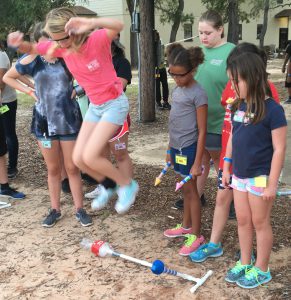
Gulf and Franklin County campers shooting rockets at Camp Timpoochee in June 2017.
As the school year wraps up, you’re likely trying to fill up your child’s summer with fun and educational programs. Fortunately, you’ll find a variety of day and residential summer camps out there. Does the thought of sending your child to camp cause anxiety for your or your child? If so, let’ me give you some tips to eliminate those concerns.
First, summer day camps and residential camps can be some of the most memorable events in a child’s life. Some children make memories and friends that last a lifetime. But as a parent, you need to feel comfortable about the camp you send your child to.
When starting the camp selection process, begin with your child’s interests. Make sure you know the camp will provide activities that will enhance your child’s personality and maturity level. Including your child in the process will help them feel more secure and excited about what camp will offer them. This will also help get rid of some of their anxiety because they’ll know what to expect (especially if they have never attended camp before).
Here are questions recommended by the American Camping Association (ACA) to help you make the best summer camp decision.
Questions to Consider in Selecting a Residential Camp:
- What locale do I want to consider? (mountains, oceanfront, distance from home, etc)
- Do I want a traditional camp that gives my child a wide variety of experiences, or do I want to select a specialty camp that focuses on a particular activity or set of skills?
- What size enrollment will make my child feel comfortable?
- How rustic do I want the camp to be?
- How structured do I want the program to be? Does my child like to have lots of choice in the activity schedule?
- Is my child ready to sleep away from home for an extended stay? (This will help you to select either a resident or day camp setting.)
- What session length will appeal to my child and to our family plans for the summer? (One week? Eight weeks? Length of day?)
- How can I stay in touch with my child during camp? Does the camp allow mail, phone calls or e-mail? Does the camp have parent visitation days?
- How will the camp meet my child’s special dietary or physical needs?
- What is my budget for camp tuition? (Remember, many camps offer financial aid.)
Questions to Consider in Selecting a Day Camp:
Day camps offer experiences unique from residential camps. Because of this, there are specific points to consider when choosing a day camp – transportation, overnights, swimming lessons, food service, horseback riding, group pictures, t-shirts, extended care, field trips, etc.
- Does the American Camp Association accredit the camp? (ACA has specific standards applicable only for day camps.)
- What training does the staff receive on safety, supervision, counseling, problem solving and other issues unique to working with young children?
- Is the price all-inclusive or are there extra charges?
- If transportation is offered, where is the closest pick-up location?
- Does the camp have an “express bus” which transports children quickly?
- If before and after-camp extended care is offered, who is with the children and what activities take place?
- Is lunch served, or do campers bring their own sack lunch? Are snacks and drinks provided?
- If the camp offers swimming, are there swimming lessons, or is it simply recreational swimming?
- Are campers in a group with a counselor all day? Or, are campers free to go from one activity to another with appropriate supervision? In this case, who would you talk to if you had a question or concern about your child?
- Is an open house offered before camp starts where you can meet your child’s counselor and van/bus driver?
- Are parents allowed to drop by for visits or is there a special parent visitation day?
Along with the above questions, you should also know that in the state of Florida, summer camps are not inspected or regulated by the Department of Children and Families (DCF). This makes it even more important for parents to gather information about the quality and safety of the program on their own. Parents should check to see if they are welcome to visit and observe the camp in action or attend activities with their child at any given time including water activities.
DCF suggests you ask these questions:
- What the programs health, safety and nutrition policies and procedures?
- Is the staff screened?
- What are the staff/child ratios and group sizes of the program?
- Is the staff well-trained?
- Is the program licensed or accredited?
- Are parents welcome to visit? Are family activities offered?
- Is there a daily lesson plan?
- Is the facility adequate for the number of children enrolled?
- What are the hours of operation, fees and payment procedures?
Download the Selecting Summer Care for School-Age Children: A Quality Checklist at http://www.dcf.state.fl.us/programs/childcare/docs/SummerChecklist.pdf.
Because you should know – Florida law does require summer camps to conduct background screenings of all camp personnel, including owners, operators, employees and volunteers. Volunteers providing less than 10 hours of service per month do not need to be screened as long as they are always within sight of a person who meets the screening requirement. In the state of Florida, the camps supported by UF/IFAS Extension meet each of the standards above.
The above questions and items to consider should help you in the camp selection process. Always feel confident in asking any questions – as the parent, you have the right to feel confident in your child’s camp selection.
As you begin your summer camp search, remember to check out the day and residential camping programs offered by your local 4-H program. We are confident in our volunteers and staff competency and would love to have your child participate in our safe and fun-filled summer camps. Contact your local Extension Office for more details.
Resources for this article may be found at: www.acacamps.org and www.myflfamilies.com.
by Jenny Savely | May 20, 2016

Danielle with her state officer team and Adam Putnam, Florida Commissioner of Agriculture and 4-H Alum.
How do you 4-H? Through 4-H, youth can participate in clubs, mentorship, project mastery, competitions, local, state, and international trips, and service opportunities unlike any other youth development program in the country. Along with specific skills, 4-H also works to impart life skills, or workforce readiness skills, to its youth. One of the best ways 4-H teaches leadership and responsibility to youth is by giving youth the power to choose how involved they will be and take ownership over what their experience will look like. When youth choose in fully to 4-H, the results are remarkable and inspiring. When our Senior 4-H’ers (14-18 year olds) take advantage of all that is available to them, the impact is a rewarding one. One can observe Senior aged 4-H’ers youth who are both driven to challenge themselves and who take ownership of their own success in 4-H and of their county and state program at large. One such extraordinary example is State 4-H Council Treasurer, Danielle Tinker of Escambia County, FL.
Danielle affectionately says she had to “beg” her mother to get her involved in 4-H. That kind of drive is indicative of the approach Danielle has taken in her 4-H experience overall. “One of the greatest things about 4-H is that it has given me opportunities to try so many new and different things. Some of them… I am glad to have been exposed to them and had opportunity to learn about those things…Then there are areas and events that have changed who I am and where I will end up in life.” Because Senior 4-H youth are able to define their experience, they can explore the depth of their interest area. Sometimes only by trying on various projects do youth find the field that drives them most of all. After pursuing projects like hiking, camping, drama, participating in the fair exhibits, and consumer judging competitions, Danielle got involved in leadership and livestock raising. Here Danielle found her niche. She has passionately pursued many leadership roles at the club, county, and state level and succeeded in her goal to be part of the process of improving the program and spurring others to be involved. Her love of leadership and livestock together have helped Danielle to define her goals in a way that captures both areas, saying that “Through 4-H I have discovered that I love raising livestock and I hope someday to have my own farm where I can raise and care for livestock.”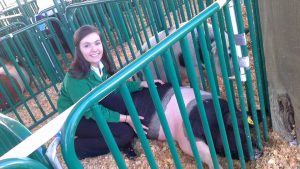 Her entrepreneurial spirit, developing mastery in hog raising, and the leadership skills she has learned will translate into the lifelong values and behavioral change we see in many of our 4-H’ers that have let their experiences direct how they think of others, themselves, and their place in the world.
Her entrepreneurial spirit, developing mastery in hog raising, and the leadership skills she has learned will translate into the lifelong values and behavioral change we see in many of our 4-H’ers that have let their experiences direct how they think of others, themselves, and their place in the world.
Being able to translate skills like leadership, responsibility, communication, resourcefulness, and being goal oriented from a specific task or project to all aspects of life is the type of behavior change positive youth development strives for. When asked about the benefits of 4-H, Danielle said,
“4-H has helped me develop skills that I can use in my future such as self confidence, public speaking and time management…Maybe most importantly through the leadership opportunities, events, and trainings that I have had in 4-H, I will never be the same. I have gained confidence, skills, and abilities that I can carry with me into whatever my future holds.”
Though all 4-H youth develop these skills, as youth age into being a Senior 4-H’er, many new opportunities become available that put them at the center of their county and state programming. Projects, leadership opportunities, and travel for this group is much more challenging and autonomous than the mentor heavy experience of younger 4-H’ers. Youth are able to meet with their peers throughout the state and nation who are delving into making what they experience in 4-H part of their lifelong vision and goals for themselves.
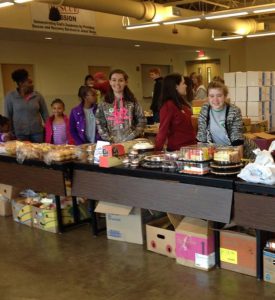 One of the most important skills 4-H teaches is to use your head, heart, hands, and health not only for oneself but for club, community, country, and world. Years of community service through 4-H have helped to mold Danielle into an empathetic and thoughtful young woman.
One of the most important skills 4-H teaches is to use your head, heart, hands, and health not only for oneself but for club, community, country, and world. Years of community service through 4-H have helped to mold Danielle into an empathetic and thoughtful young woman.
“I have learned about compassion for others through community service, and gained a passion for teaching and helping others get the most out of the opportunities afforded them through 4-H and that understanding will go with me in whatever I am passionate about as an adult.” While Danielle has pursued 4-H to the hilt, there is something to be gained through every experience.
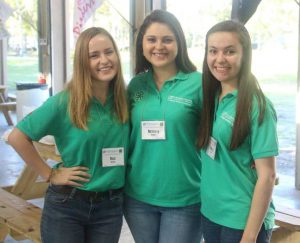
Senior 4-H’ers can choose to be part of many incredible experiences that are exciting, rewarding, and continually challenge them in the moment as well as throughout their lives. 4-H is a program for all ages. Get on board. Contact your local county agent or look into all the incredible opportunities at the Florida 4-H website.

by Melanie Taylor | Dec 11, 2015
 The holidays are often filled with time-honored traditions that include some of our favorite meals and foods. As you celebrate, think of little changes you can make this holiday season to create healthier meals and active days. An added bonus, these small changes may help you to avoid those extra holiday pounds we all fear each year. Happy Cooking!
The holidays are often filled with time-honored traditions that include some of our favorite meals and foods. As you celebrate, think of little changes you can make this holiday season to create healthier meals and active days. An added bonus, these small changes may help you to avoid those extra holiday pounds we all fear each year. Happy Cooking!
In the Kitchen:
• For gravies or sauces — if you are making pan gravy, first skim the fat off pan drippings. For cream or white sauces, use fat-free (skim) milk and soft tub or liquid margarine.
• For dressings or stuffing — add low-sodium broth or pan drippings with the fat skimmed off instead of lard or butter. Use herbs and spices and a whole grain bread for added flavor.
• For biscuits — use vegetable oil instead of lard or butter and fat-free (skim) milk or 1 percent buttermilk instead of regular milk.
• For greens — use skin-free smoked turkey, liquid smoke, fat-free bacon bits, or low-fat bacon instead of fatty meats.
• For sweet potato pie — mash sweet potato with orange juice concentrate, nutmeg, vanilla, cinnamon, and only one egg. Leave out the butter.
• For cakes, cookies, quick breads, and pancakes — use egg whites or egg substitute instead of whole eggs. Two egg whites can be substituted in many recipes for one whole egg.
• Use unsweetened applesauce or mashed ripe bananas instead of butter.
• Try cutting the amount of sugar listed in recipes in half.
• Use spices to add flavor such as cinnamon, allspice, or nutmeg instead of salt.
• Try baked apples with cinnamon and a sprinkle of sugar instead of apple pie.
• Invite your guests to make their own parfait with colorful sliced fruit and low-fat yogurt.
For meats and poultry (chicken and turkey):
• Trim away all of the visible fat from meats and poultry before cooking.
• Take off poultry skin before eating.
• Broil, grill, roast, poach, or boil meat, poultry, or fish instead of frying.
• Drain off any fat that appears during cooking.
• Chill meat and poultry broth until fat becomes solid. Skim off fat before using the broth.
• Skip or limit the breading on meat, poultry, or fish. Breading adds fat and calories. It will also cause the food to soak up more fat during frying.
• Choose and prepare foods without high fat sauces or gravies.
When Shopping:
• Start with a lean choice.
• The leanest beef cuts include round steaks and roasts (round eye, top round, bottom round, round tip), top loin, top sirloin, and chuck shoulder and arm roasts.
• The leanest pork choices include pork loin, tenderloin, center loin, and ham.
• Boneless skinless chicken breasts and turkey cutlets are the leanest poultry choice.
Use the food label to help you choose
• Choose extra lean ground beef. The label should say at least “90% lean.” You may be able to find ground beef that is 93% or 95% lean.
• Processed meats such as hams, sausages, frankfurters, and luncheon or deli meats have added sodium. Check the ingredient and Nutrition Facts label to help limit sodium intake.
• Fresh chicken, turkey, and pork that have been enhanced with a salt-containing solution also have added sodium. Check the product label for statements such as “self-basting” or “contains up to __% of __.”
• Lower fat versions of many processed meats are available. Look on the Nutrition Facts label to choose products with less fat and saturated fat.
De-Saturate
• Use a nonstick pan with vegetable cooking oil spray or a small amount of liquid vegetable oil instead of lard, butter, shortening, or other fats that are solid at room temperature.
Enjoy the Food, Fun, Friends and Family!
Cheers to Good Health
• Quench your thirst with low-calorie options. Drink water with lemon or lime slices. Offer seltzer water with a splash of 100% fruit juice.
Be the Life of the Party
• Laugh, mingle, dance, and play games. Focus on fun and enjoy the company of others.
Give to Others
• Spend time providing foods or preparing meals for those who may need a little help. Give food to a local food bank or volunteer to serve meals at a shelter during the holiday season. Giving back is a great mood booster.
Make Exercise a Part of the Fun
• Make being active part of your holiday tradition. Have fun walking and talking with family and friends after a holiday meal. Give gifts that encourage others to practice healthy habits such as workout DVDs, running shoes, and reusable water bottles.
Enjoy the Leftovers
• Create delicious new meals with your leftovers. Add turkey to soups or salads. Use extra veggies in omelets, sandwiches, or stews. The possibilities are endless!
Be sure your family and friends enjoy the food and fun, but focus on the time together. Remember this season is all about the memories, not just the food. You will feel better and enjoy your holiday time with less worry if you focus on staying healthy this season.
Source: USDA United States Department of Agriculture – www.MyPlate.gov
by ewestbrook | Nov 13, 2015
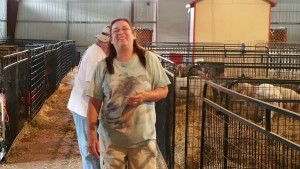
For more than 33 years, Priscilla Weaver has been teaching youth about animal science through the 4-H club program.
This time of the year you can find her at the North Florida Fairgrounds in the livestock buildings. As the North Florida Fair’s Livestock Director she’ll be busy putting on a great livestock show and competition for youth and adults. Priscilla Weaver is passionate about growing the 4-H animal science program. For more than two generations (33 years) Priscilla has been teaching youth about animal sciences and animal husbandry as the Kapra Kids Dairy Goat 4-H Club Leader in Wakulla County, Florida.
Priscilla started the club when she saw a need for her children and their friends to have an opportunity to participate in 4-H. “Youth need things like 4-H in their lives to grow up well,” says Priscilla. When asked why she thinks youth need 4-H Priscilla replied, “4-H teaches young people so many things, things like responsibility, caring and the ability to see a project through to its end.”
Priscilla has raised dairy goats her whole life, so when she started her club she worked with her club members in that project area. Her club has had as many as 16 members before and has won uncounted number of awards and ribbons showing their goats and their dairy by-products like cheese and soap at the Florida State Fair in Tampa, Florida
. Priscilla feels strongly about teaching today’s youth about animal husbandry saying,
“It teaches them so many things; math and science, recordkeeping, planning and responsibility. Participating in a 4-H animal project also teaches caring and empathy by having responsibility for an animal,” says Priscilla.
Empathy and caring are two traits Priscilla has in abundance. When not volunteering for 4-H, she spends her free time working at the fair, caring for her own livestock, or volunteering with the senior group at her local church. These traits also display in the activities of Priscilla’s 4-H club as they participate in many community service projects and also in her leadership of multi-club service projects at places like the local senior center.
When asked what has kept her going as a 4-H volunteer for so many years Priscilla will tell you that it’s because, “she loves working with the youth.” Because of volunteers like Pricilla, 4-H is able to help youth grow resilience, empathy, and responsibility through animal science programs. These are life skills that will help youth be successful no matter what career path they choose. If you want help empower young people to be the best they can be by sharing your passions in a meaningful way Like Priscilla has, consider becoming a 4-H volunteer. The Florida 4-H Program offers a wide variety of volunteer roles to fit your schedule, interests and skills. Contact your local UF IFAS Extension Office or visit http://florida 4h.org/volunteer for more information on how to volunteer today.
by Niki Crawson | Oct 9, 2015
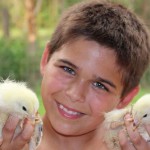
Noah, a Holmes County 4-H member, is learning responsibility through the 4-H Chick Chain project.
Regardless of the age-old debate, “which came first, the chicken or the egg?” one thing is certain- raising chickens is a big responsibility. One of the newest and most creative ways that some of our Florida 4-Hers are learning the importance of being responsible is through the 4-H Chick Chain pilot program.
This year, six counties in the Florida Panhandle partnered with Alabama 4-H to offer the Chick Chain program. The goal of this project is to help youth learn life and workforce skills while learning how to raise and show chickens. Thirty-six Florida 4-H members chose to take on the responsibility of raising 18, two-day old chicks from May through October. Over the course of the program, youth participated in workshops to learn how to care for their chicks, keep records of their project, and how to prepare their animals for a show. This past Saturday marked the culminating event of the project when youth participated in a show and auction in Ozark, AL. During this event, youth competed in a showmanship competition, record book competition, and poultry quiz. All three events counted towards their overall score.
Members also had a short course in entrepreneurship- they were required to meet with potential buyers and market their hens. Life skills were clearly present in every aspect of the 4-H Chick Chain program which aided youth in the further development of not only responsibility but also confidence, capability, and compassion. When asked about his experiment, Noah, a Holmes County 4-Her shared:
“Chick Chain is a great opportunity to learn about responsibility and respect for other people and animals. You get to raise 18 of your very own chickens for a couple months and then get to take them to a show with your fellow 4Her’s to compete for ribbons and money. You also learn about proper sportsmanship. I love it!”
Based on participant’s feedback, we will be expanding the pilot next year and making some exciting programmatic changes. Holmes County 4-H parent and club leader, Jewellyn Owens, was instrumental in developing the Chick Chain pilot for Florida because she saw the potential this program had to help youth learn valuable life skills while increasing their knowledge about agriculture. Jewellyn shares:
“My family Loves Chick Chain. It is a great program for children wanting to do a 4-H livestock program but their parents don’t feel they are ready yet or can’t afford the cost of the larger livestock. Chick Chain has taught my children respect, sportsmanship, caring for another living creature and responsibility. My children love seeing their chicks grow from 2 day chicks to full grown egg laying chickens. Best part is getting to eat their chicken’s eggs. I also feel it teaches them other aspects of life like record keeping, writing, leadership skills, financial responsibility all things that will help them years down the road.”
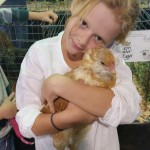
4-Hers spent 6 weeks learning how to care for their chicks, biosecurity, showmanship, and recordkeeping.
If you would like to help 4-H grow responsibility in your community (through this program or others) consider becoming a 4-H volunteer. For more information about becoming a volunteer, or to find out about next year’s 4-H Chick Chain program, contact your local UF IFAS County Extension Office. We are also looking for sponsors to help expand this program.
For more information, check out:









